Recovery staggers on
wrecked in a way one might expect in a war zone.
it’s a very tough environment and people’s heads are dropping.”
A LEADING Hawke’s Bay orchardist says the recovery in the region is taking place in a ponderous way.
Paul Paynter, of the Yummy Fruit company, told Hort News he believes it will take up to 15 years for the region to recover fully from Cyclone Gabrielle. He says the way things are going, the apple industry in the region could shrink by about a third.
In Esk Valley, Paynter’s company has lost 120,000 apple trees – all buried under two metres of silt. The valley is still littered with cars caught up in fences and tangled vines, with houses
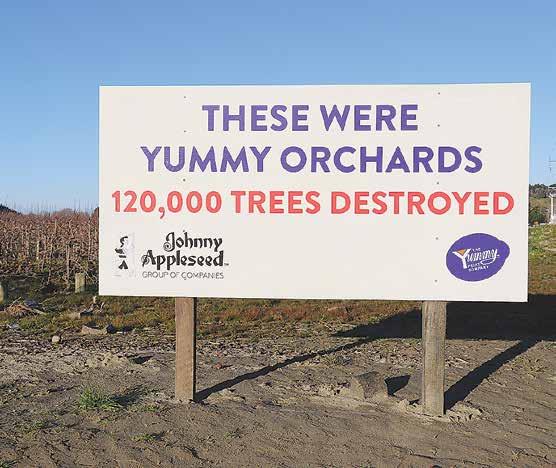

“It’s pretty hard confronting that every day. I’ve been to Esk Valley 8 or 10 times and every time I go I have pull over at the side of the road and take a few deep breaths,” he told Hort News
“I know what I am going to see but it’s difficult to cope with the tragedy. It has a psychological impact.”
Paynter says in the Esk Valley there are people who open their curtains every morning and see a disaster zone.
“You know they may be living in their garage or fixing up their half destroyed house and it’s pretty hard on them mentally,” he adds. “It’s hard on relationships, very hard on finances, so
Paynter says it’s taken a long time for the Government to form a plan, which includes interest-free loans from Kanoa, a government agency. He says this is fine, but in essence it’s just more debt and most people already have a debt problem.
Paynter believe some people have lost up to 50% of the value of their balance sheet and only have a small amount of equity left, so getting out of the debt hole will be challenging.
He says industry margins have been squeezed over the last couple of years. Everything has gone up: wages, shipping, energy, insurance. Meanwhile,
prices have gone down and the big question is whether people can service the debt.
“The final thing is the demographics of the industry. Your average fruit grower looks a bit like your average farmer: north of 60 years old,” he explains. “They are thinking that it may take them at least 20 years to get back to normal and are asking themselves, ‘is it worth it?’ Instead, they may opt to pull out the trees and plant an annual crop for Watties and spend time with the grandkids.”
On the positive side, Paynter says there may be an option for orchardists to pull out damaged trees and replace them with newer varieties of apples,

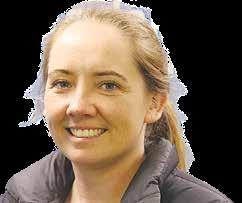
SPRAY PUMPS & EQUIPMENT

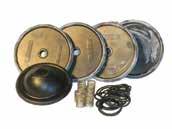
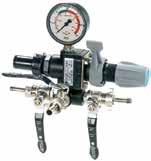


which could get a higher premium in overseas markets. They may also get to upgrade their growing systems.
However, he warns that if people do rebuild their orchards, they need to get their assumptions about markets right. He points out, for example, the present problems with the Chinese market.
Paynter says with the sun shining people can hopefully turn their mindset around and see the opportunity for a new crop.
But he believes this won’t be easy given that people have gone through a long, miserable winter trudging around in sludge.
“It’s been pretty confronting for them,” he says.
High-quality spray pumps from ANNOVI REVERBERI , BERTOLINI & COMET available now. Webbline stock a wide range of spray pumps, service kits and sprayer accessories, making it easy to find the perfect solution.
HORTNEWS SEPTEMBER 2023, ISSUE 37 ISSN 2624-3490 (print) ISSN 2624-3504 (online) WWW.HORTNEWS.CO.NZ A brighter – Page 5
Peter Burke peterb@ruralnews.co.nz
BEN BOAKES SPARE PARTS SPECIALIST 021 819 482 www.webbline.co.nz webblineltd @webblineagltd WAIKATO • MANAWATU • CANTERBURY • SOUTHLAND
The top of this pole would normally be standing two metres high, but it now has only a few centimetres showing with the rest of it and trees behind it buried in silt. The sign says it all!
Getting to know and understand RSE workers key to success
HORTICULTURALISTS
WANTING to employ overseas workers under the Recognised Seasonal Employer (RSE) scheme should learn about, understand and support their workers’ home cultures.
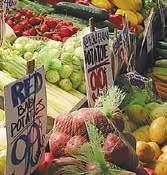
That’s the advice of Bay of Plenty-based kiwifruit orchardist Lee Du Preez, who is also people and business development at Southern Cross Horticulture (SCH). She says the company has been visiting Pacific Island communities for seven years – since even before it started employing workers under the RSE scheme.
Du Preez says this has enabled SCH to create a well-rounded RSE programme that caters for their workers’ individual cultures.
“This in turn helps SCH to create a ‘home away from home’ feel and a sense of belonging for our RSE while they are with us in NZ. It also steers the multiple offshore community upliftment projects which we create, drive and sponsor.” She says SCH teams go to the islands to meet with key stakeholders –from government ministers to village chiefs, councils and communities. They also regularly visit their workers and their families once they are back home, to celebrate their achievements,
assist with their reintegration into the community and provide support for their continuing community projects.
Du Preez recently spoke at the RSE conference, part of the inaugural Horticulture week in Christchurch, which brought together the annual conferences of the RSE employers, Horticulture NZ and NZ Apples and Pears.
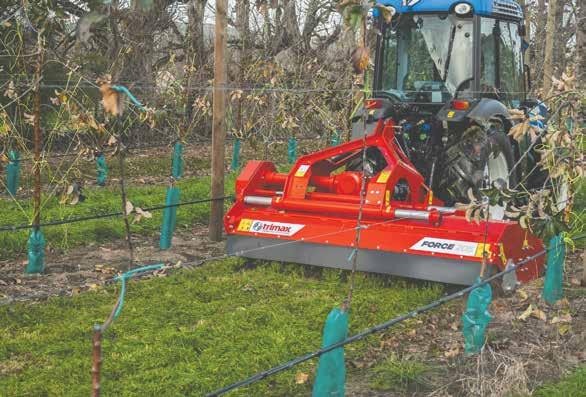
She explained that a first step of SCH’s recruitment process was to travel up to the Pacific Islands, to introduce themselves and talk with and experience the local
communities, to gain an understanding of their cultural practices, religions, and daily lives.
“Being an RSE employer was about forging a wider partnership with the Pacific,” Du Preez says.
She added that the company’s purpose was to develop world-class crops through a skilled dedicated team which shared the company values.
“Fundamentally
enhancing lives is really what we’re about,” she added. “Our quest to becoming an RSE employer was more around getting a firsthand understanding of what it’s like to live in these countries that we will be recruiting from – how those people face adversity in an island that’s sinking 13 metres every year with no fresh running water, limited employment opportuni-
ties, and limited opportunity for education.”
Du Preez says SCH has sponsored a number of schools and kindergartens in the Pacific with support including educational supplies and sporting equipment.
“In a country where they don’t have shops often, they don’t have access to educational supplies. Things like a paintbrush, you just cannot find in some of these
islands.”
Du Preez believes the impact of climate change is now a huge part of life in the Pacific, giving one example of an RSE recruit who had been housing 15 members of his family in a tent on a site now completely under water.
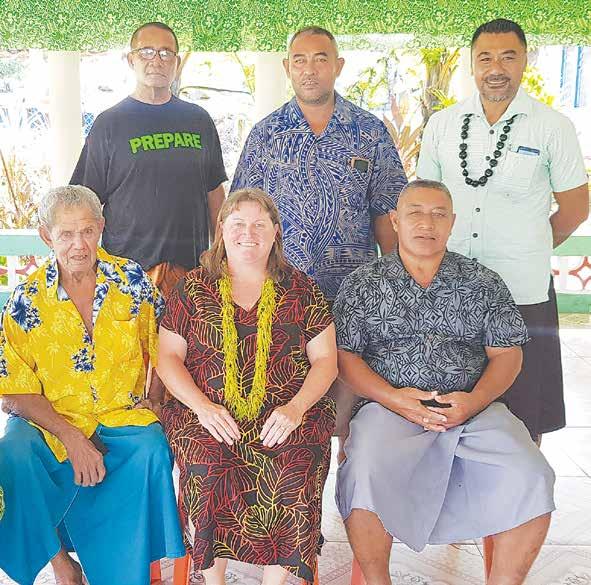
“So, his goal for being an RSE was to build solid housing that could last through the climate change,” she told the conference “It’s very reward-
ing to see just how many lives we can change through the scheme.”
Growing future leaders is a vital part of the programme both in the islands and while the workers are in New Zealand.
“One of the things we really enjoy doing with our RSE, is all of the cultural days that we have to honour them and to thank them for what they bring to us,” Du Preez added. “They educate us and our team a lot and they educate our New Zealand team and we embrace that. The health and well-being of our RSE is first and foremost.”
Speaking to Hort News after her presentation, Du Preez wasn’t sure how common it was for other employers to support Pacific communities in a similar fashion.
“We were one of the earlier adopters in that space. I don’t know how many employers actually do this, but I know that it’s just part of what we do.” She believes going to the islands is integral to a successful RSE programme.
“Enhancing lives actually means taking the time to invest in their community to understand their needs. You’re not just employing the RSE worker. You’re actually employing their family and their communities.”
SCH currently has 176 RSE workers on the books and has applied for more.
SEPTEMBER 2023 2 HORTNEWS
Nigel Malthus
“One of the things we really enjoy doing with our RSE, is all of the cultural days that we have to honour them and to thank them for what they bring to us. They educate us and our team a lot and they educate our New Zealand team and we embrace that. The health and well-being of our RSE is first and foremost.”
Are you hitting your target market? Contact your local sales representative for more information ✔ BREAKING NEWS ✔ MACHINERY REVIEWS ✔ MANAGEMENT STORIES ✔ AND MUCH MORE... HORTNEWS RURAL NEWS TO ALL FARMERS, FOR ALL FARMERS Auckland Stephen Pollard Ph 021-963 166 Waikato Lisa Wise Ph 027-369 9218 Wellington Ron Mackay Ph 021-453 914 Christchurch Kaye Sutherland Ph 021-221 1994
Lee Du Preez (front centre) meets Matai (chiefs) of some of the Samoan villages which are home to RSE workers employed by Southern Cross Horticulture in New Zealand. SUPPLIED
Getting better connected
NUFFIELD SCHOLAR


NEW CHAIR of Potatoes
NZ (PNZ), Paul Olsen, wants the organisation to connect and engage better with its levy paying members.
Olsen took on the chair role of the levy funded organisation, which represents all NZ growers, a few weeks ago after being on the board for four years.
He says PNZ represents both large and smaller operators and he wants all growers to know what the organisation is doing.
He also wants to get feedback on what it could do better.
Olsen believes in the past PNZ has not connected as well as it could have. He wants to change this and bring greater unity to the sector.
“I’d like to start and get back up growers’ driveways and make sure the levy funded organisation is effectively representing all growers and they can see the value in paying a levy to PNZ,” he told Hort News
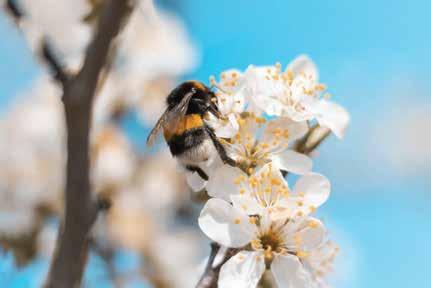
For many generations, Olsen’s family have been growing potatoes and dairy farming in Opiki, located in the Horowhenua – between Levin and Palmerston North. While his focus is on growing potatoes, he farms with his brother Shaun as part of a dairy
farming and drystock business.
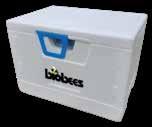
About 50% of the potatoes that Olsen grows are exported to Fiji, with the rest are sold through various distributors through domestic markets. He employs about five other people on a seasonal basis but admits he’s not a large grower compared with others.
The farms are located on flat Opiki land, near the Manawatū River. Looking east at this time of the year, the Tararua Ranges are often covered in snow and provide a stunning backdrop. The land is a mixture of peat
and silt soils, where the dairy farming operation is very much pasture based.
Olsen also leases land in the area to ensure that there is a satisfactory rotation between crops.
He has been on the farms at Opiki for 19 years now. Olden attended the local school, went to Palmerston Boys High School and then on to Lincoln University to complete a Diploma in Farm Management.
“After that I worked for a couple of cropping farms down south and came back to Opiki in 2004,” he told




IN 2014, Olsen was awarded a prestigious Nuffield scholarship, where his research focused on global potato production.
He found this to be a great experience to see some of the challenges that other parts of the world face and to witness first-hand their innovations. For him, it was the catalyst to not just accept the status quo, but to continue to find ways to drive and progress.
“A couple years ago, I did an Executive MBA from Massey University as well. That enabled me to think a bit longer term around governance and wider industry leadership,” he says.
Olsen adds that while he enjoys being out on the tractor – especially on a fine day – he also likes looking at the numbers, working through scenarios and evaluating strategic opportunities.
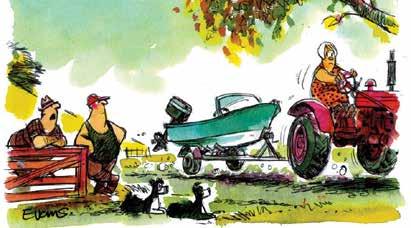
But in his new role as chair of Potatoes NZ, Olsen will have to split his time not only between the dairy, dry stock and potato growing operations, but also in his leadership role in helping to shape the NZ potato industry.
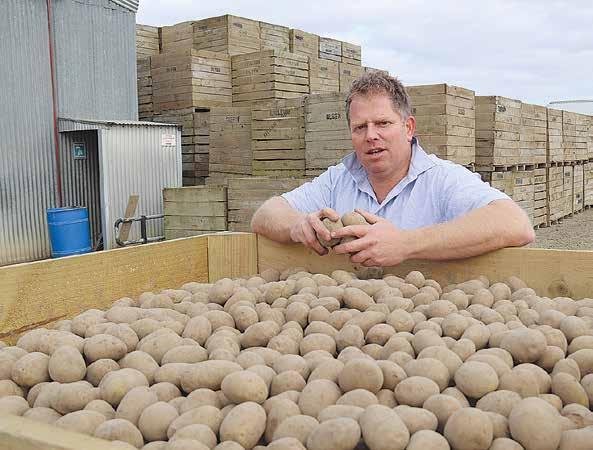
3 SEPTEMBER 2023 HORTNEWS
Peter Burke peterb@ruralnews.co.nz
@rural_news facebook.com/ruralnews
2024 Edna Calendar T: 09-307 0399 then press 1 to be put through to reception E: julieb@ruralnews.co.nz ORDER NOW! ❱❱ $25 including post & packaging ❱❱ 12 of Edna’s best cartoons ❱❱ 330mm x 240mm, spiral bound EDNA!! EDNA CALENDAR 2024 “We’re going fishing and I’ve got Edna driving the boat up and down to charge its battery.” “Help! – someone just set Ag sector plans to slash methane emissions back ten years!” RURAL NEWS HORTNEWS SUNDAY MONDAY TUESDAY WEDNESDAY THURSDAY FRIDAY SATURDAY 1 2 3 4 5 6 7 8 9 10 11 12 13 14 15 16 17 18 19 20 21 22 23 24 25 26 27 28 29 WAITANGI FEBRUARY 2024 JANUARY 17 22 30 MARCH 11 16 24 29 NORTHLAND SOUTHERN FIELD BUMBLEBEES POLLINATORS YOU CAN TRUST WEATHER HARDY WORK MORE DAYS & LONGER EACH DAY SYNERGY WITH HONEYBEES ALTERNATE PEAKS OF ACTIVITY IMPROVED SPEED & EFFICIENCY BETTER CROSS-POLLINATION UP TO 20X BETTER IN SOME CROPS 2 - 3X FASTER ON FLOWERS DEPENDABLE ACTIVITY NEW INSULATED BOX + = www.biobees.co.nz office@biobees.co.nz (06) 879 -5883
Potatoes NZ chair Paul Olsen wants the organisation to connect and engage better with its levy paying members.
GST removal not the way to reduce vegetable costs – major grower
RICHARD BURKE is a big fan of making fresh vegetables more affordable to the consumer and says his company Leaderbrand will do anything to support that.
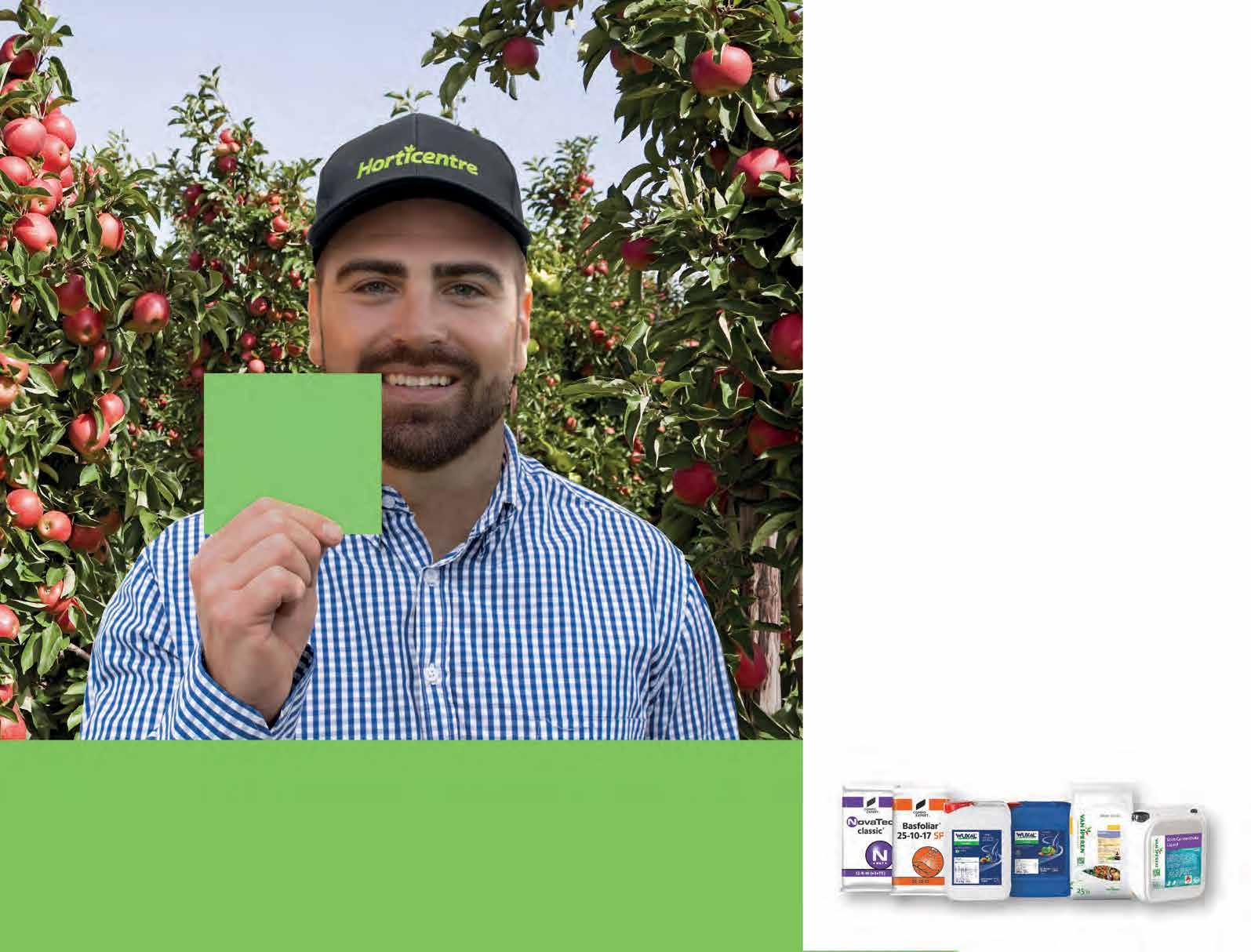
However, he told Hort News the idea of taking GST off vegetables has
been raised before and while he hasn’t looked at the latest proposal, people who have run the numbers on the concept before say it’s not worth it.
As the biggest fresh vegetable grower in the East Coast region and a major employer, Burke says his company is supportive of anything that
can create a more competitive fresh vegetable market because it will result in an uplift in health for the nation.

“A lot of the cost of providing fresh vegetables is in the logistics and delivery,” he told Hort News. “I feel that if we improved our infrastructure around the country, then a lot of the cost of
fresh product would be reduced.”
Burke also believes efficiency in production is another factor and is hopeful of seeing changes, like having a more streamlined system of compliance to reduce the multiple inputting of data which is time consuming and costly.
“Changes in this area
No shortage of summer salads
LEADERBRAND’S CEO Richard Burke says there should be no shortage of summer salads this year – despite all the trials and tribulations caused by the weather.
He says the cabbages are already in the ground because they take the longest to grow and the other plants will be going in soon. He believes that the summer supply will be excellent.
Burke says it’s been an interesting six months and while Cyclone Gabrielle didn’t hit them as badly as it did Hawke’s Bay, Leaderbrand has still had to cope with a very wet and difficult winter. He says it will be interesting to see how spring kicks in.
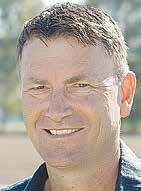
“It was worse than last winter and there was no land preparation; we were always down on the amount of
land that was available because of the wet summer and the cyclone,” Burke told Hort News. “We have had a winter where we didn’t hit our volume targets so that’s been a challenge.”
Leaderbrand has also had issues in Pukekohe and to a lesser degree in Matamata where the company also grows crops. Burke says the rain made planting difficult in winter and for a
and more resilient infrastructure would make a huge difference.”
In terms of the cyclone recovery, Burke says while there was a lot of action at the start, it now appears to have slowed down. He says in farming circles there is a lot of talk about what is happening and there’s not a lot of clarity.
couple of weeks they were scratching around to get supply. He says the impacts of the cyclone and the rain may be felt for some time yet.
Burke says people need to understand what it means for them if extremes of wet and dry weather continue. He says infrastructure has generally been designed for the past and it needs to be upgraded.
“Getting accurate information has been a challenge,” he told Hort News

“Clarity around what is going to happen is important so that people can move on because, when you don’t know, it’s the hardest thing. If you do know and it’s not what you want to hear, then at least you can plan for it.”
“We still have to address our drainage and river management, which we used to be pretty damn good at,” Burke told Hort News
“But we have fallen off that and other things have taken priority. As a region – and probably as a country –we need to get those priorities back on track and use our infrastructure wisely. – Peter Burke
SEPTEMBER 2023 4 HORTNEWS
Peter Burke peterb@ruralnews.co.nz
Leaderbrand chief executive Richard Burke.
A brighter future ahead?
SIXTY FIVE percent of NZ’s apple crop is grown in Hawke’s Bay and 4000 hectares – or about half the total crop grown in the region – has been affected by Cyclone Gabrielle.
NZ Apples and Pears market access manager Danielle Adsett told Hort News, while her organisation is not involved in the marketing of apples, it’s been assured by exporters that the expected lower crop is being carefully managed.
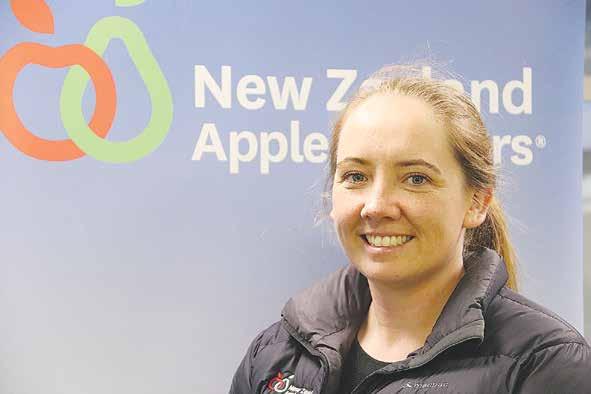
NZ apples are sold to almost 70 countries around the world – with China being our largest market. However, only 13% of NZ’s total crop is sold there. Vietnam has, in a matter of years, risen from 13th to become our 3rd largest market.
Adsett says Asia is
obviously a focus for NZ as the middle class in those countries grows.
Taiwan and Japan are also
up-and-coming markets.
“The fact is that NZ produces the best apples in the world because of our growing systems and climate,” she told Hort News. “As such, we are
able to offer a premium product.”
Adsett says, in sustainability terms, NZ has already done an awful lot but hasn’t really told the story about our low
carbon footprint and our quality orchard management practices. She says, on a per hectare basis, the NZ apple sector is highly productive compared with others.
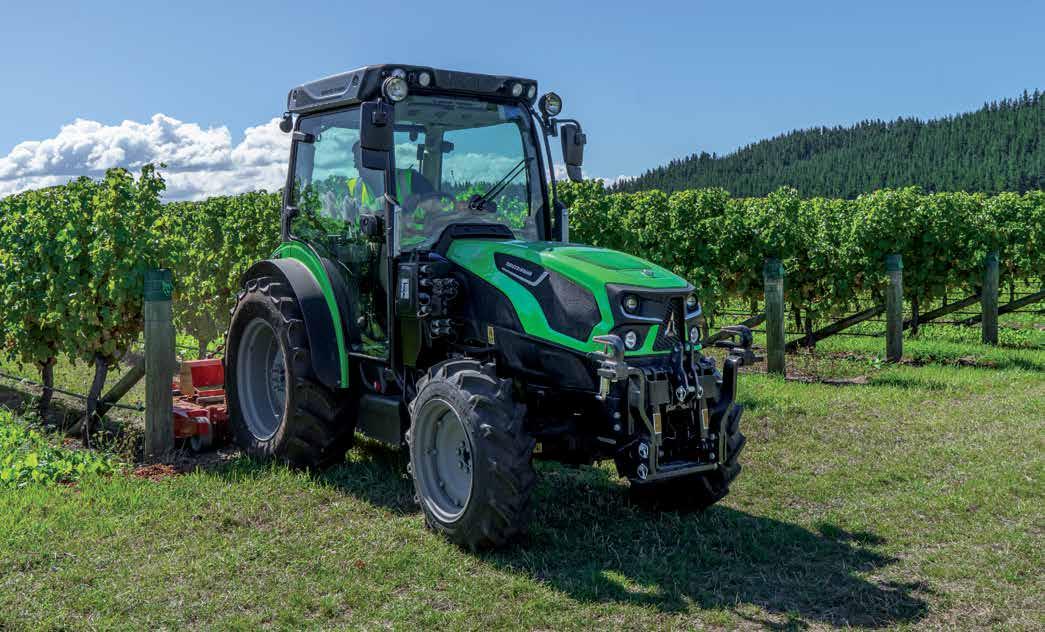
She adds the other big change is the image of the sector and how it’s portrayed.
“Many people perceive it to be a manual labour industry with a focus on


picking and pruning trees. But this is so far from the truth,” says Adsett. “The job has definitely changed and we have seen that in the orchards and the packhouses. We have stories about some of our members bringing in people from the job seeker benefit into their packhouse who are now running their multi-million dollar technology.”
She says the industry has absolutely changed and is all about technology and exciting innovation, with great jobs on offer.
Adsett concedes that while many people are trying to be optimistic about the future, the reality for many is still heart breaking.
“Trees remain covered in silt; the ground is wet and people are doing their best to support each other in very difficult times.”
5 SEPTEMBER 2023 HORTNEWS
Peter Burke peterb@ruralnews.co.nz
“The job has definitely changed and we have seen that in the orchards and the packhouses. We have stories about some of our members bringing in people from the job seeker benefit into their packhouse who are now running their multimillion dollar technology.”
2 YEAR WARRANTY CONFIGURE TO SUIT YOUR REQUIREMENTS HORT CABIN RANGE Power Farming NZ | www.powerfarming.co.nz | 0800 627 222 THE PROVEN EUROPEAN SPECIALIST CABIN RANGE Best of all we’ve got your back with flexible finance options. Call today. $1370 FROM * * *Terms and conditons and normal lending criteria apply. Prices valid for a limited time only and while stocks last. 2000 hour/2 year warranty. » 85-115HP with a choice of transmissions including TTV » True 4-wheel braking » Market leading hydraulic systems 100l/min of oil flow » 100% front locking differentials » Available in 4 widths from 1,077mm to 1,795mm » Scan QR code for more info deutz nz
NZ Apples and Pears market access manager Danielle Adsett says the expected lower apple crop is being carefully managed.
Waiting for trees to wake up
HAWKE’S BAY apple growers are holding their collective breath waiting to see whether spring will bring good or bad news.
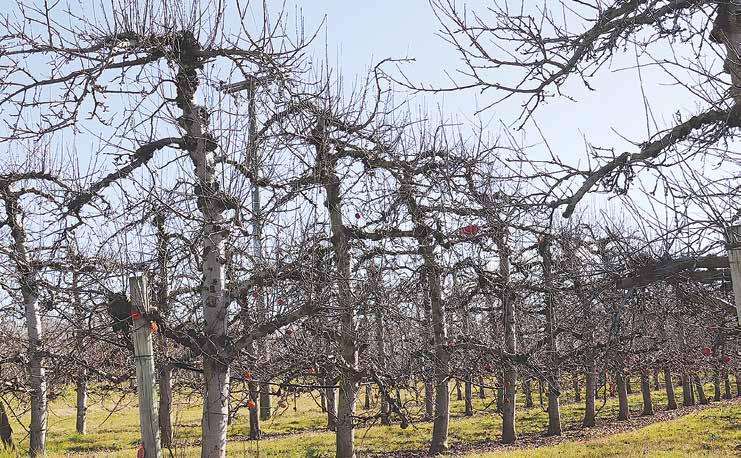
NZ Apples and Pears market access manager Danielle Adsett told Hort News that spring will provide orchardists with the first sign of whether or not their apple trees have survived the ravages of Cyclone Gabrielle.
She says the trees are still asleep and the first indication of what might have happened to them will be at bud burst. She adds the problem will be around the root system of the trees.
“When they start to bloom and set fruit, the trees will expend quite a lot of energy and with a small root system, the question is whether or not they survive that or show signs of disease,” Adsett explains.
“That is something we are working on to help growers.
“We have given advice post cyclone about what management techniques they could do to help
the survivability of their trees.”
Adsett says it depends on the viability of individual trees to crop. She explains that if a number of trees in a block are diseased, then it’s likely the orchardist will pull out all these trees, because it wouldn’t be viable to have a block that’s producing a
reduced crop.
In terms of the recovery in Hawke’s Bay, Adsett told Hort News that orchardists will be in different positions. She says some will have dug out the silt from around their trees if they could, while others may have been waiting to see what financial packages the govern-
ment had to offer.
She says NZ Apple and Pears is aware that 80% of the growers in Hawke’s Bay that have been affected by Cyclone Gabrielle have orchards that are 100 hectares or less in size.
“Larger growers have also been affected, but it’s essentially the ‘mum and

dad’ orchardists that are the worst hit,” she says.
For the small orchardists, there is less ability to ‘resize’ their operations, whereas it may be easier for the larger operations to do this because these people have more land. Adsett says there are some areas such as the Esk Valley where apple
Scales keeps loss in balance
SCALES CORP has recorded a 43.5% fall in underlying net profit after tax (NPAT) for the six months ending June 30.
This saw the owner of Mr Apple’s profit plunge from $25.6 million in the first half of last year to $14.5m in 2023. This also saw a corresponding drop in underlying earnings before interest, tax, depreciation and amortisation (Ebitda) of 25.1% - from $55.4m to $41.5m.
Despite the big profit drop, the company has stuck to its earlier guidance of underlying NPAT to shareholders of $14m to $19m and say it expects horticulture to “return to more normal performance” next year.
Mr Apple’s total own-grown export volumes are forecast to be 2.7 million twenty-foot container equivalents (TCEs), down from 3.3m TCEs in 2022. The company also noted that Mr Apple had 26% of its crop left to
be sold, compared to 40% at the same time last year.
Scales managing director Andy Borland says Cyclone Gabrielle had reduced its apple crop, but the company had still seen strengthened demand for air freight, along with new customers.
“Scales delivered a resilient result in what was an extremely difficult 6-month period for the Horticulture division.”
trees are covered in up to two metres of silt and there will be areas that growers will deem to be too high risk to plant again. However, she notes that in places where the stopbanks have been repaired, people may go ahead and replant.
“How the industry builds out of this will
Borland added that in the wake of Cyclone Gabrielle “extensive orchard remediation has taken place with approximately 165 hectares of damaged orchards recovered from silt, debris and slash”.
He says an outstanding effort by the company’s horticulture team has resulted in around 50% of recovered blocks being re-seeded, with a target to complete the re-seeding by the end of August.
be really interesting,” she says. “That’s why we are very grateful for the finance scheme proposed by Grant Robertson that, on the face of it, looks good. Hopefully, our members take it up if they’re in a position to do so and there is an opportunity to build back better.”
Adsett believes this would enable growers to incorporate new orchard designs allowing for future automation, and planting some of the emerging apple varieties, which are ideally suited to new markets – especially those in Asia.
She says Covid highlighted a number of issues, including a shortage of labour to harvest the apple crop.
Adsett adds that since then there has been a massive investment by growers in new technologies.
“These involve such things as picking platforms that make it easier to attract a wider labour pool, but the overall aim of this investment is designed to negate some of the increasing production costs.”
Borland says Mr Apple had experienced “encouraging” growth in its premium varieties of Dazzle and Posy, especially in China.
He conceded that it had been a “extremely difficult growing and postharvest period for horticulture”, for the wider Hawke’s Bay produce industry, which resulted in lower volumes.
“However, higher in-market apple prices have helped to compensate for the lower volumes.”
SEPTEMBER 2023 6 HORTNEWS
Peter Burke peterb@ruralnews.co.nz
by CP Lime Three ways to healthier soil Call us 0508 678 464 or visit cplimesolutions.net.nz to book your test and find out which one is right for your soil. Optimise Fine Magnesium CO3 95% Mg 27.5% CO3 72% S 19.6% Ca 28.8% Optimise Fine Lime Sulphur CO3 95% Mg 27.5% CO3 72% S 19.6% Ca 28.8% CO3 26.5% S 19.1% Ca 9.1% N 12.3% Mg 1.1% Humates 3.6% Optimise Kickstart CO3 95% Mg 27.5% CO3 72% S 19.6% Ca 28.8% CO3 26.5% S 19.1% Ca 9.1% N 12.3% Mg 1.1% Humates 3.6%
Spring will provide orchardists with the first sign if their apple trees have survived the ravages of Cyclone Gabrielle
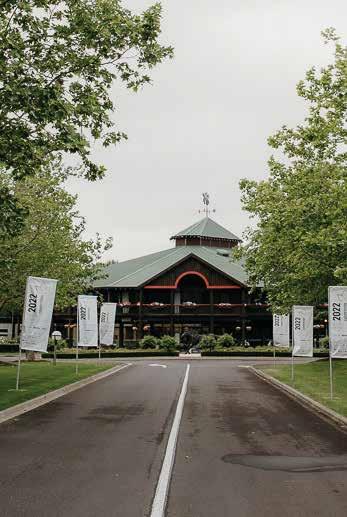

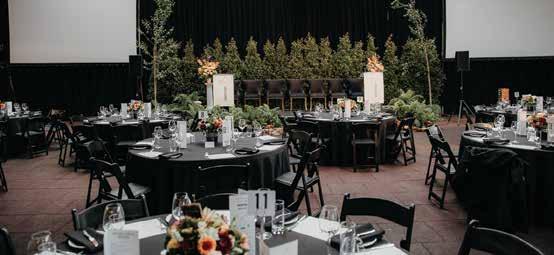

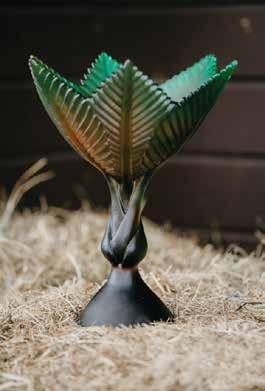
GRAND FINAL DINNER & AWARDS CEREMONY Tickets available from Eventbrite , link on website www.younghort.co.nz , email info@younghort.co.nz or Ph: 09 294 7129 Join our MC for the evening: Steve Gurney Adventurer - Motivator - Inventor
is an ex-professional adventure athlete, turned professional motivational speaker and trainer. He won the Coast to Coast a record nine times and raced mountain bikes for NZ at the world champs twice. He got an engineering degree, invented a bike with wings, was poisoned by bat dung in Borneo and nearly died, and then fought back to win the Coast to Coast 7 times more, in a row. Steve is now a published author with 3 books and is a trainer in the field of NLP (Neuro Linguistic Programming). He loves inspiring people to greater heights and teaching how to make mole-hills out of mountains. 6.00pm, Wednesday 8th November, 2023 Karaka Bloodstock, Auckland EARLY BIRD PRICING $245 incl GST or $2450 per table of 10 TICKET PRICES FROM 7TH OCTOBER $295 incl GST Be quick, get your tickets now for the Join us as we celebrate our 2023 Young Horticulturist Competition Award Winners and watch as our Young Horticulturist Winner is crowned BirdEarlyTickets ONNOWSALE
Steve
Tech not a one-stop shop




PICMI COULD be described.as a one-stop shop for seasonal recruitment.
However, founder Genevieve Griffin-George says technology is “never just a one-stop shop”.
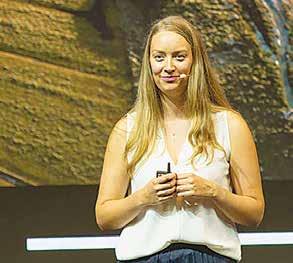
Griffin-George founded PICMI after stepping in to manage her family’s kiwifruit orchard after her father was involved in an accident.
She says she found the amount of paperwork involved frustrating and that it was getting increasingly difficult to find seasonal workers.
When Griffin-George’s father recovered postaccident, she returned to her consulting job, but the frustration remained and work she was doing in Australia as part of an accelerator programme showed the problem wasn’t limited to New Zealand.
Her research with jobseekers showed things weren’t much better for them either.
They were oftentimes struggling to find work and frustrated by having to fill out the same information over and over.
“It’s about solving a grower problem,” she told Hort News. “Tech is such an amazing tool and it can be used in so many different ways.”
The PICMI cloudbased software allows employers to post job ads with job-specific criteria and complete onboarding tasks, all in a way that’s paperless.
“It means jobseekers know where they stand,” she says, explaining the software means jobseekers don’t have to endure uploading their CVs multiple times, or the hassle of making it to multiple job interviews.
But Griffin-George is

quick to point out that tech like hers is not a onestop shop and it may help in ways they don’t expect.

“Often growers will receive a solution, but not the one they expect,” she says.
Arriving back in New Zealand, Griffin-George teamed up with two technologists and thus PICMI, a cloud-based app designed to streamline hiring, was born.
She exhibited the
idea at the New Zealand National Fieldays. There, she met members of the team from EvokeAg “and they encouraged me to apply for the Future Young Leaders programme”.
In 2020, she was selected for the programme which offers five emerging leaders from Australia and New Zealand the opportunity to showcase their ideas, innovation, or research to
an international audience.
AgriFutures general manager, global innovation networks Harriet Mellish says the program recognises the contributions of young industry leaders in our food, fibre and fuel production systems, and provides them with the support systems, networks, and connections to thrive in their careers.
“The Future Young Leaders Program is a unique experience where we provide the opportunity to connect bright minds with industry experts and peers, to nurture innovation and share their ideas and research on an international platform,” Mellish says.
“The program is searching for participants who are passionate about agriculture and want to be part of the driving force behind ensuring Australia is a leader in accessing and adopting innovation.”
GROW MORE VEGIES!
BEING ABLE to grow more vegetables could be one way to bring prices down, according to Vegetables New Zealand Incorporated (VNZI).
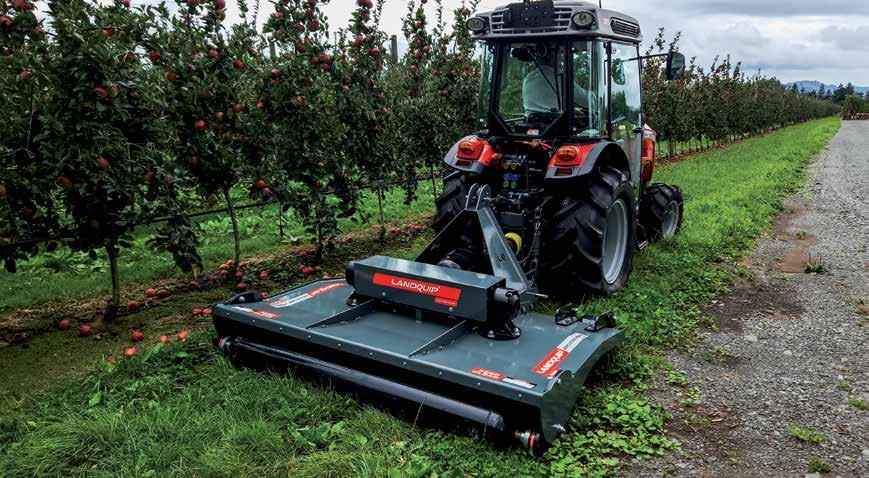
It also believes this would lead to improved health outcomes for New Zealanders and support an industry that is vital to the country.
“There’s massive support, particularly in the health and education sectors, for taking steps to make healthy fresh New Zealand vegetables more available to Kiwis,” says VNZI chair, John Murphy.
He adds that the New Zealand vegetable industry needs fit for purpose regulations that allow vegetable operations to thrive, by encouraging investment in vegetable production and eliminating hurdles that limit productivity.
“Ultimately, any effort to make it easier for Kiwis to eat more locally grown vegetables is good for New Zealand society.”
Murphy also claims the debate about removing GST from food has been welcomed by the vegetable sector.
“VNZI applauds any attempt by regulators to increase fresh vegetable consumption and make it easier for growers to be viable because of the health benefits,” he explains.
“If changing tax settings would decrease the cost that consumers and growers face, then we should look seriously at a change.”
SEPTEMBER 2023 8 HORTNEWS
Jessica Marshall
Genevieve Griffin-George says technology is “never just a one-stop shop”.
0800 269 776 info@landquip.co.nz landquip.co.nz/mowers SPRINGTIME MEANS IT’S TIME FOR MOWING! Explore Landquip’s Vineyard and Orchard Mowers: Innovative, stylish, and aerodynamic, these mowers offer a superior cut, easy cleaning, and versatile material discharge options, including mulching and side or rear discharge. SPECIALIZED VINEYARD AND ORCHARD MOWERS MANUFACTURED IN NZ BY LANDQUIP.
Apple growers urged to join together on data collection
THE HORTICULTURAL sector has much to gain from harnessing digital technology, machine learning and artificial intelligence to transform food production systems.
That’s the view of Australian technologist Chris Mendes who says growers need a data model.
“You’ve got to be able to actually say ‘this is what my data looks like to the computer. These are the things that matter. This is how they relate to each other’,” he explained.
“But if you want to share amongst yourselves, this is going to be essential: you’ve got to have an agreed data model where you can actually exchange information in a meaningful way. You need a platform where you can bring it all into one place.”
Mendes, a founder and chief technology officer of the Australian company Yield, spoke at the Apples and Pears section of the inaugural joint Horticulture Week in Christchurch.
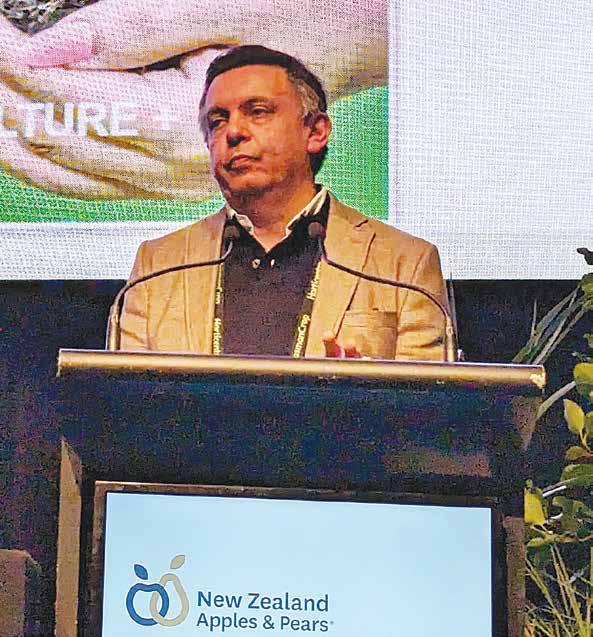
He told the conference that better use of resources on the ground, the better and earlier predictions of harvest timing and yields will ultimately interact to increase productivity.
Mendes, an electrical engineer by training, told the conference
he had moved into largescale data crunching in the finance sector before being invited to consider how data management could be applied to agriculture.
His company has now produced a yield management platform that answers growers’ ques-
tions like how much they’re going to produce, when will the harvest be and when is labour needed, fruit quality, tonnage and other factors.
“All of this feeds into your supply chain and other logistics that you’re going to have to deal with,” Mendes told grow-
ers. “It is really about predictive models, it’s forward looking. It’s about recommendations, and what you need to do to be ready for tomorrow.”
Mendes explained when he worked in finance, they were importing a lot of data into a central model but
had to build individual translators to handle the data coming from each stock exchange. Yield had now done something similar with the crop management system because growers want to do things their own way.
“It’s going to be a lot easier though if you guys
work together and come up with your own model.”
Mendes says growers have a lot of data “floating around” but a lot of it was siloed information.
Prior to launching in the US, the company had surveyed businesses there and found that they overwhelmingly knew that managing their data was their future but they were struggling with it.
A huge number also said that they would like to have all their data in one place.
“This is a really important thing because so many of the businesses that you guys run have got data in all sorts of systems,” he added.
“You’ll have an HR system, you’ll have a harvest management system, you might have a farm management system, all of those things, and the data is kind of isolated and it makes it really difficult for you to pull reports together to understand what is going on in your business.”
Mendes says 75% of the surveyed growers were spending 11 hours or more a week wrangling data, ‘just fiddling
around bringing their data together’, which is a huge productivity loss.
He says while machine learning sounds scary, it was about taking the data that growers generate themselves, and applying some methods to it to see what works. Once it’s trained it can be put into production; when it stops working it can be retrained.
“If you’ve got the right data, you can really get quite good predictive models in place for yourself. That’ll give you a lot of early warning about what’s going to happen.”
One example he gave was how the platform assessed the last four years’ weather in the Barossa Valley and was able to predict a late grape harvest for the 2023 vintage.
Mendes says this information was a huge value to the growers.
“We know growers who didn’t use it and they had people waiting on the property to harvest grapes a month before it was ready.
“And, as you can imagine, that cost these growers a lot of money.”
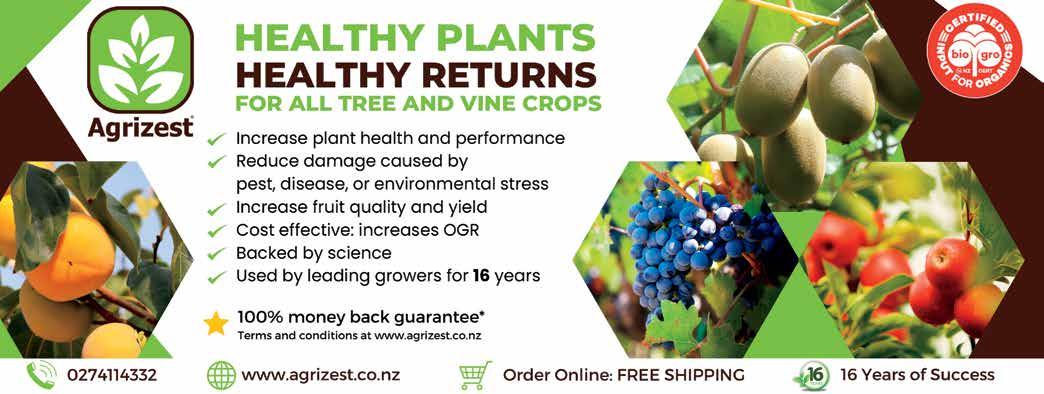
9 SEPTEMBER 2023 HORTNEWS
Nigel Malthus
“You’ve got to be able to actually say ‘this is what my data looks like to the computer. These are the things that matter. This is how they relate to each other’.”
Australian technologist Chris Mendes and founder of the Australian company Yield.
Vertical farming on the up!
A MECHANICAL growing system being set up in Ashburton shows the potential for an alternative method of producing leafy greens to boost New Zealand’s food production security.
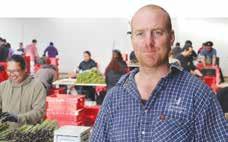
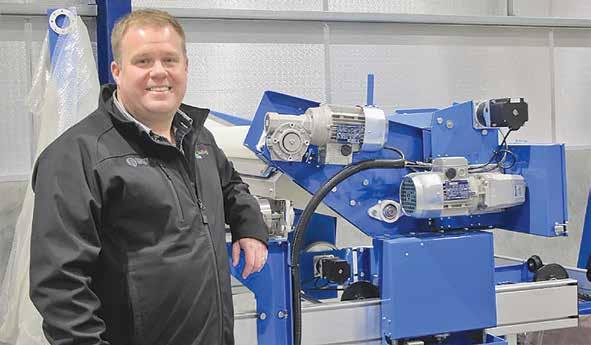
That’s the claim of New Zealand primary industries supply company Landlogic. It says the Ashburton set-up showcases what a vertical food production system can do.
It will be the first opportunity for many NZ horticulturists to see the Australian-designed modular system in action.
Designed for warehouse installation, with plants grown in multilevel trays contained in enclosed climate and light-controlled cells, the system is heavily automated with com-
puter-controlled feeding, watering, lighting, and sensors monitoring temperature, pH, EC and humidity levels. Loading, harvesting, recovery and re-use of the growing medium and reloading the trays are also automated, as is the packaging machine.
This closed and autonomous system is said to be highly resistant to intrusion from pests and weeds, need no pesticides or herbicides and has a water efficiency rate of 99.9%.
Landlogic is the importer and distributor of Vertical Farm Systems for New Zealand and the Pacific.


Chief executive Alan Cottington says the increasing unpredictability and frequency of severe weather events and rising costs impacting traditional openfield farming meant it
was more important than ever to consider new approaches to agriculture.
“Our food security is vulnerable when we rely on traditional farming methods or importing for leafy greens, which are a basic and healthy food essential,” he adds.
“To remain competitive, New Zealand needs to get on board with this technology and ensure there will always be a reliable and efficient alternative to in-ground production available.”

Cottington says data sourced from Stats NZ
shows that New Zealand’s annual production of leafy greens is 8400 tonnes grown on 1621 hectares.
He claims to grow the same volume with the XA Vertical Farm System would be just 12 hectares – making it a 99.25%
Introducing Hort News, a national publication serving the needs of our booming horticulture sector.

Distributed with the leading national farming publication Rural News, Hort News will be delivered to all key horticulture regions nationwide.
It is the complete solution for readers and advertisers, covering every aspect of the wider horticulture industry – news, agribusiness, management, markets, machinery and technology.
GETTING READY!
more effective use of land.
A test bed VFS system in Australia’s Sunshine Coast factory was producing around 600kg of salad greens and herbs a week, delivering the resulting produce to local retailers and restaurants.
“Where traditional outdoor growing systems have taken such a huge hit in recent floods and storms, VFS crop turn-around times are 28 days, regardless of external influences,” Cottington adds.
“Harvest times and end product quality are consistent and reliable, allowing commercial growers to confidently commit to delivery schedules and quantity agreements.”
He says by comparison, outdoor planting to harvest takes approximately 65–80 days for midsummer plantings, and up to 130 days for autumn/winter plantings.

The company says the VFS system is best suited to fast-growing crops, including leafy greens such as loose-leaf lettuce, bok choy, beet chard, and herbs such as coriander and basil.

SEPTEMBER 2023 10 HORTNEWS
Leo Argent
Landlogic chief executive Alan Cottington at the company’s mechanical growing system set up in Ashburton.
HORTNEWS
Contact: STEPHEN POLLARD Auckland Sales Representative Ph 021 963 166 LISA WISE Waikato Sales Representative Ph 027 369 9218 RON MACKAY Wellington Sales Representative Ph 021 453 914 KAYE SUTHERLAND Christchurch Sales Representative Ph 021 221 1994 RURAL NEWS TO ALL FARMERS, FOR ALL FARMERS Publishers of • It’s the
•
• 10,000
•
and
Rural News HORTNEWS NOVEMBER 2021 ISSUE 19 ISSN 2624-3490 print ISSN 2624-3504 online WWW.HORTNEWS.CO.NZ Bumper cherry –predictedcrop Page 7 Sweet result for hort! SOME HORTICULTURE farmers are also bracing for financial relief from the proposed free trade agreement between New Zealand and the United Kingdom. Apple, pear and onion growers are among those set to benefit although ers.notasbigmajormeatanddairyexportAlanNZApplesandPearschiefexecutive PollardsaysatthemomenttheUK is a $100 million market for growers, consistently ranking in the top two or three. “We have a quota between August and December where volume above that quota attracts an 8% tariff,” he told Hort News Under the proposed FTA, the tariff on pears will be removed on day one, with the tariff on apples reducing over three years “So, there is some financial relief andwebenefitfromamorewelcoming regulatory environment,” says Pollard. Onion growers will face zero tariff from day one. The tariff on New Zea- land onions is currently 8%. New Zealand currently exports $11 million worth of onions to the United King- domOnionsannually. NZ chief executive James Kuperus says the FTA will ensure that this country’s onion exports continue to grow as the world comes to terms with Covid. “Trade and exporting ben- efits a diverse range of New Zealand businesses,” he says. “Without clear trading arrange- ments, improved market access and reduced tariffs, it is extremely difficult totoexportfromthebottomoftheworld larger economies like the United Kingdom. “Of immediate benefit to the onion sectoristheexpectationoftariffsbeing eliminated on onions, once the agree- ment comes into force.” The New Zealand Government announced the details of an “in-prin- ciple” New Zealand-UK FTA last week as trade officials neared completing the deal after little more than a year of negotiations. Kuperus says the NZ onion sector is extremely grateful for the hard work of New Zealand’s negotiatorsanddiplomatswhohaveworked tirelessly to conclude this agreement. “The New Zealand team has had toatjoinZoomcallswiththeircounterparts night,extremelyinconvenienttimesofthe for example.” The conclusion of this agreement willbenefitoniongrowersandregional communities, from Pukekohe to Can- terbury. Onions are an important rota- tion crop for many vegetable growers. Having onions in a rotation allows growers to rotate between other crops such as lettuces, potatoes, carrots etc, which helps to control pests and diseases. In 2019, the NewZealandonionindustrywasworth $200 million back to the grower, 85% of which came from exports. MeandealwhileApicultureNewZealandsaysthe industrywillbeagreatoutcomeforthebee andwillimprovecompetitivenessinoneoftheirlargestexportmarkets. The UK consistently ranks as one of top three export markets for New Zealand honey and is worth $70 mil- lion annually. “We have strong ties with UK customers, with a long his- tory of exporting high-quality honey products there. However, the current in-quota tariff rate of 16 per cent hasbeenasignificantbarriertotrade,”says KarinKos,chiefexecutiveofApiculture New Zealand. Sudesh Kissun sudeshk@ruralnews.co.nz
one-stop way to reach the horticultural sector
News and information for all types of growers
nationwide distribution
Sent out with the trusted
established publication
MANGAWEKAASPARAGUSmanager SamRaineyoverseesan80hectare asparagusinthecentralNorthIsland. WhenHortNewsvisitedtheproperty inlateSeptember,Raineyandhisstaff wereinthefinalstagesofpreparing fortheharvest.Thepackhousewas beingsetupandatthesametimethe firstspearsofasparaguswerestarting toappear.Whilethetotalsizeofthe propertyis80hectares,theywillpick just65hectaresthisseason–which equatestoupto250tonnes. Seestorypages4and5. Replacement Spray Pumps & Spray Kits Webbline Agriculture is a direct importer/reseller of a full range of pumps from market-leading manufacturers, along with service kits and accessories. Large range in stock. Dealer enquiries are welcome. View online - www.webbline.co.nz Contact Ben 021 819 482 | ben.boakes@webbline.co.nz WAIKATO •CANTERBURY • SOUTHLAND branches NOW PUBLISHED MONTHLY! To book your advert contact your local sales rep
Major investment delivers big rewards for commercial spud grower
GROWING POTATOES requires suitable ground, an experienced workforce and a substantial investment in plant and machinery.
S T Growers, based near the vegetable heartland of Pukekohe, has been operating for more than 35 years, with a Global GAP accredited packing operation at Tuakau. Aiming to grow high quality produce, the business pays special attention to sustainability – with longer crop rotations, the use of cover crops and optimal cultivation and harvesting techniques.
In a typical season, the company grows around 200ha of potatoes, mostly for the chipping industry.
Until recently, the harvesting part of the equation centred around two older, two-row trailed machines. Along with drivers, these machines needed a team of around 10 employees to harvest 50 tonnes of crop per day.
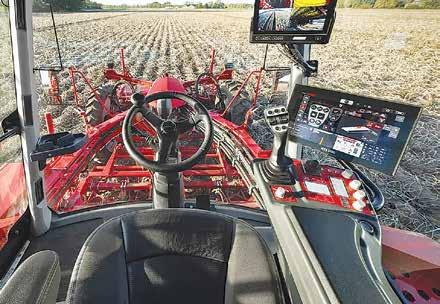
However, as with much of the agricultural sector, hiring and retaining good staff has become more difficult, with lots of mornings starting with an extended wait to see who would show up.
A recent major investment saw the arrival of a 15-metre long, 4m high and 25 tonne colossus from Germany in the shape of a Grimme Varitron 470 Terra Trac, self-propelled harvester.
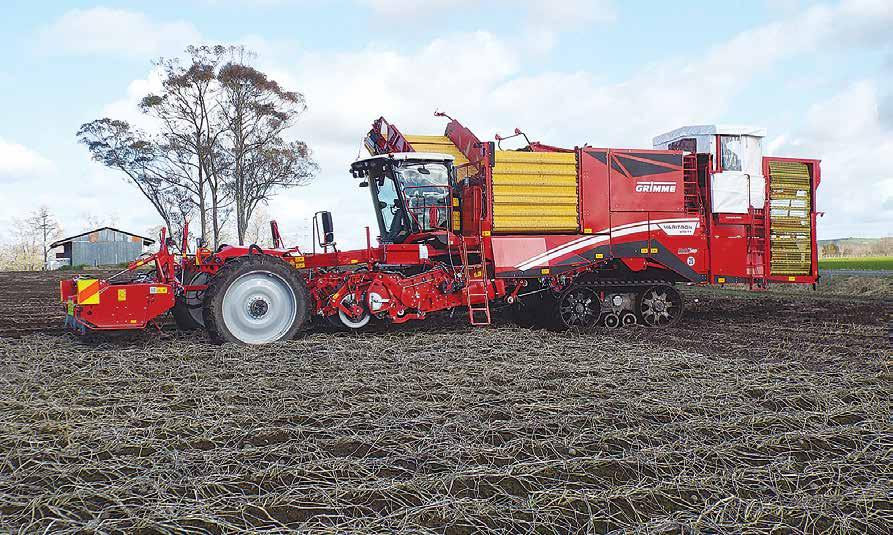
Powered by a Mercedes 460hp engine, the machine has a four row configuration. It is equipped with a 7 tonne, non-stop bunker system,
which effortlessly lifts up to 25 tonnes of spuds per hour. The machine has led to a reduction in labour of around 80% as it only needs the machine operator and one or two assistants on the final picking table.
Up front, a pulled diablo roller intake unit is equipped with TerraControl that automatically regulates ridge pressure and depth control.
The hydraulically driven intake web and the first and second main webs are equipped with independent speed adjustment, while the fine haulm and ring elevators are reversible.
The first main web also incorporates a speed adjustable rocker agitator. The first extracting






unit features automatic reversing, while the rear of the machine features a 1200mm ring elevator with canvas.
With ground compaction a major consideration for ST Growers, the front end of the machine is carried by 270-95R54 tyres. Meanwhile, the main body of the machine runs a Claas-sourced TerraTrac system, running on twin 800mm wide by 3000mm long rubber tracks.
These deliver a 2000mm contact patch that typically exerts only 9psi when fully loaded.
To aid manoeuvrability, the front steering angle is 63 degrees, while the undercarriage of the track system also offers a 15-degree steering
angle. Ease of use with the machine sees a +/100mm side-shift system built into the front axle.
Up top, the operator sits in a Claas-sourced Vista cabin offering excellent visibility. It also features leather seating with active heating and cooling, climate control and Bluetooth connectivity.
Operations manager Karl Dempsey, a 25-year potato industry veteran with 5 years at ST Growers, takes control of the harvester with a multi-function joystick, with real time performance and adjustment taken care of via a panoramic display. This is aided by around 15 cameras mounted around the machine, which during any problems use the
whole screen to give visibility in the problem area.
Unlike more typical Varitron 470s, this machine is unique and currently the only example in the world configured with a manual pick-off table.
This is manned by one or two operatives to remove.
“In reality, the fantastic lifting and separation quality we achieve means anyone on top gets a very easy life,” Dempsey says. “But we chose this speci-
fication because we lift and drop the harvested potatoes directly into one tonne boxes that go straight to Bluebird for chipping.”
Obviously, the removal of any transhipping and final cleaning at the packhouse means costs are substantially reduced.
“Jumping into the cab for the first time was a bit mind blowing after running the trailed machines, but the installation and support by the Claas Harvest Centre teams over
Swiss precision. Made to last.
the first few days was brilliant,” Dempsey adds.
“The machine is already pre-programmed with basic settings, which you can ‘tweak’ as you become more familiar. There is also a settings memory feature, which means you can recall previous settings that have worked well.
“All in all, it is light years ahead of our old, trailed machines and making a huge difference to our harvesting operation.”
11 SEPTEMBER 2023 HORTNEWS
Mark Daniel markd@ruralnews.co.nz
The Grimme Varitron 470 Terra Trac, self-propelled harvester can lift up to 25 tonnes of spuds per hour.
Available at your local FELCO Stockist. Heiniger is the exclusive FELCO distributor and authorised service centre in NZ - contact us to find a FELCO dealer near you. (03) 349 8282 | heiniger.co.nz
(Inset) The harvester is aided by around 15 cameras mounted around the machine, to give visibility of any potential problem areas.
LOPPERS The perfect balance of power and manoeuvrability. The
211
FELCO POWER TOOLS Power through even the biggest jobs with ease. Designed to act as an extension of your body, the new FELCO Power Blade series feature lightweight, ergonomic handles for comfortable pruning all day long. NEW
FELCO 211
FELCO
range feature
lightweight aluminium handles for comfortable cutting and curved cutting heads to pull in and easily slice through branches
Paper pots lead the way
PAPER-BASED growing is being adopted by nurseries for seedling and cutting production.

Biodegradable paper pots or cells hold individual seedlings, which are planted directly into the ground without disturbing the roots of the crop. While reducing carbon footprint is one thing, early adopters of paperbased growing systems are also singing its praises for faster production and healthier root development.
Automating the process of large-scale propagation is not new. However, Swedish company BCC FiberCell can now deliver an environmentally friendly solution that also stacks up economically.
Distributed in NZ by PrimeHort, the latest FiberCell Paper Pot machines, paper pots and tray holders are suitable for most NZ crops.
PrimeHort points out that FiberCell Paper Pots are 100% biodegradable at varying levels to suit crop requirements, from as little as 4-6 weeks through to 12 months. The pots air-prune roots as they grow towards the pot’s edge, preventing root circling, to encourage healthier root systems and better/faster plant growth.
Other benefits include planting the paper pot directly into a next-stage
and shrubs. The company is one of NZ’s most respected and largest wholesale nursery operators.
It had been using a similar product to a jiffy pot, with all cuttings and seedlings put into paper plugs, and after establishing a root base, the team would transplant them into bigger pots.
Already embracing nursery automation, Annton Nursery managing director Steve Burton was also looking for a sustainable solution to support his propagation efforts.
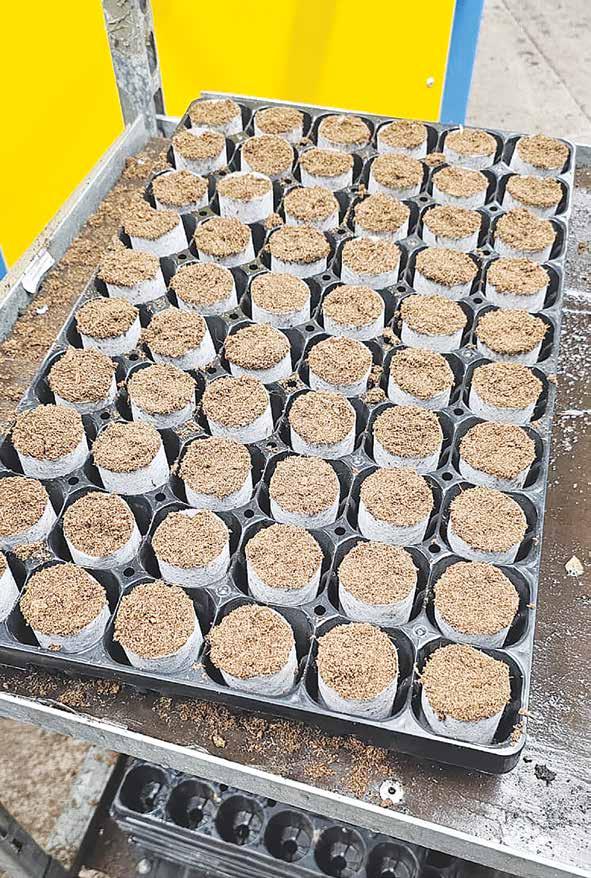
However, the productivity, quality and profit formula had to stack up. He says introducing paper pots will speed the process up, while enabling more robust, healthier plants.
The Annton team also like that each little paper pot provides its own perfect growing environment. Because the paper degrades naturally, the seedling can stay in the pot when transplanted into a bigger environment, removing transplant shock. As the paper degrades at different rates, growers can select the level of paper to suit their crop.
Burton says a further reason for choosing a FiberCell Paper Pot Machine was the upcoming expansion into strawberries.
With automation achieving about 7000 pots per hour – and only
them directly into tray holders – the innovative system dramatically reduces labour requirements, while also providing certainty around crop uniformity, quality and output.
“We’ve been using paper pots for nearly 10 years and think they are a significantly more efficient and effective way to propagate,” Burton explains. “Moving to our own machine has been driven by the increased volumes we will need for our new strawberry facility.”
This will produce over one million young strawberry plants in its first season, with capacity to increase in subsequent years.
The plants are all produced in a six-week window, which means a machine capable of producing up to 35,000 paper pots per day is needed –something that is easily achieved by the two row FiberCell machine.

Burton goes on to explain that for the remainder of the year, the operation required a machine that could increase efficiencies in their regular ornamental program.


The nursery will now produce its own 4cm pot for internal perennial propagation.
Meanwhile, the second row outside of the strawberry season will be converted to a larger 6cm diameter pot that will be dibbled and inserted with
SEPTEMBER 2023 12 HORTNEWS
Mark Daniel markd@ruralnews.co.nz
Designed for strength. Built to last. Distribution Centres: Whangarei, Hamilton, Levin, Taupo, Christchurch, Gore 0800 347 259 greenwoodinfo.co.nz GRW0006 Calf Sheds Gable Sheds Implement Sheds
Biodegradable paper pots or cells hold individual seedlings that can be planted directly into the ground without disturbing the roots of the crop.




























































